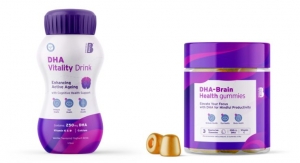Alan Richman, Contributing Writer11.03.14
With more than 22,000 peer-reviewed scientific papers already published and at least a few dozen more being created at any given moment, the role of essential fatty acids (EFAs) in lifelong human nutrition is so firmly established that only dedicated naysayers would consider debating their value. True, one research effort in 2013 resulted in some scary headlines about omega-3s and prostate cancer (see sidebar below). However, while the result was a dip in U.S. sales volume in 2013—following years of double-digit growth for the category—many scientists have challenged the methodology used in that study.
The vast majority of available evidence supports EFAs—specifically omega-3s, which cannot be manufactured by the body but must be obtained from foods or supplements—as being good for, if not critical to, maintenance of the cardiovascular system, bones and joints, cognitive health, optimal vision and more.
“Eicosapentaenoic acid (EPA) is generally used in heart health and joint health products and docosahexaenoic acid (DHA), having more top of mind awareness, in mental acuity and child brain development,” said Sam Wright IV, CEO of The Wright Group, Crowley, LA. “DHA is widely used in infant formula for this reason, with algae-based DHA holding the majority of demand.”
Much of the omega-3 content taken in via the food route comes from margarines, cooking oils, snack bars and the like, said Mr. Wright. “We tend not to eat much fatty fish in the United States in comparison to other cultures,” he explained.
When Food Isn’t Enough
If food doesn’t fill the bill, dietary supplements may supply solutions. Bob Green, chairman of West Caldwell, NJ-based Novel Ingredient Services, said, “Formulators of omega-3 supplements and other products are becoming much more sophisticated. With the wealth of omega-3 research, they can now be very specific about their formula needs—which, for example, may require an ultra-high DHA concentrate, a specific balance of DHA and EPA concentrates, or precise levels of total omega-3s.”
Noting that Novel Ingredient Services is the exclusive U.S. distributor for Norway-based GC Rieber Oils, Mr. Green said, “This is a huge growth opportunity for GC Rieber. Customization has long been one of the company’s specialties.”
The supplement side of the supply chain should also benefit from new interest in high-concentration products that are needed not only for natural products manufacturers but for a growing pharmaceutical business, said Michael Fisher, managing director of Golden Omega USA, LLC, Aliso Viejo CA, which markets “ultra-refined omega-3 concentrates (up to 85% EPA and DHA) from Chile.
Mr. Fisher cited studies showing benefits to both the brain and the heart. In one paper, from Pottala JV et al., the researchers concluded that “a higher omega-3 index was correlated with normal brain volume and hippocampal volume in postmenopausal women measured eight years later.” In another study, he said, scientists looked at the documented high ischemic heart disease (IHD) and total mortality risk associated with non-fasting plasma triglyceride (TG) levels. “High non-fasting TG has an even higher risk association to IHD than high cholesterol,” Mr. Fisher said. “Also, the lowering of risk by lower plasma TG extends deep into values that are ‘normal’ (i.e., below 1 mmol/L). This opens up a new avenue for omega-3 supplementation, as omega-3 fatty acids lower non-fasting TG.”
Referencing work by Artemis P. Simopoulos, of the Washington, D.C.-based Center for Genetics, Nutrition and Health, Emilie Slaby of The Scoular Company, Minneapolis, MN, suggested a diet with an omega-6/omega-3 ratio of 4:1 (vs. the typical value in a western diet of 20:1) was strongly correlated with a reduction in cardiovascular, inflammatory and autoimmune health challenges.
And, she added, the reduction in the omega-6/omega-3 ratio could be accomplished by increasing intake of alpha-linoleic acid (ALA).
The Choices
Looking for ALA? Mary Ann Siciliano, national sales manager of Arista Industries, Inc., Wilton, CT, would have you consider flaxseed oil, perilla oil and chia oil.
These are just a few of the alternatives to fish in the EFA world. The Wright Group’s Mr. Wright suggested the market is portioned about 80% from fish sources, 15% algal and 5% vegetable.
Putting a dollar sign on the entire market remains difficult, he noted. Some estimates of finished product sales range as high as $35 billion, but there is disagreement about that number. Meanwhile, he said, “At the raw material level, Euromonitor claims it will soon hit $3 billion. Growth has been running at a rate of more than 30% for the past several years, until the decline in 2013.”
So fish is king. But not just any fish, mind you: salmon, cod liver oil, Norwegian herring, etc. are all rich in omega-3 EPA and DHA.
There are other options as well, said Ms. Siciliano, “The omega-6 fatty acid gamma linolenic acid (GLA) is present in borage, blackcurrant and evening primrose oils.”
Linoleic acid, another omega-6, and the omega-9 fatty acid oleic acid are found in most vegetable oils, including, but not limited to soybean, safflower and sunflower oils, she continued. Hemp seed oil is also very popular because it contains omega-3, 6 and 9.
Krilling Me Softly
A relative newcomer, krill oil has been creating a lot of buzz lately. Mr. Wright said, “Krill is a separate, small factor at present, but it is growing rapidly. North America is currently the biggest market at 43% [of worldwide krill sales], with Asia in second place, at least for now.”
There’s no denying that krill has been a hot topic of conversation over the past several years. Citing SPINS/IRI data, Becky Wright, marketing director for Issaquah, WA-based Aker BioMarine Antarctic US, emphasized that krill sales suffered far less than overall omega-3 sales in 2013. Stunned by the prostate cancer scare, omega-3s in general declined around 11%, while krill sales dipped just 2% for the 52 weeks ending July 14, 2014, she said.
Looking for a dramatic bounceback for all omega-3s, Ms. Wright cited a 2013 Frost & Sullivan report stating that omega-3s can create tremendous healthcare cost savings. “The potential avoided hospital utilization costs related to coronary heart disease through the full use of omega-3 supplements at preventive intake levels could be as much as $2.06 billion on average per year, with a cumulative savings of $16.46 billion from now through 2020.”
Krill’s special role in this, she said, is that it “consistently demonstrates a higher uptake of phospholipid omega-3 fatty acids, improved blood lipid profiles, and increased uptake of DHA in brain tissue compared to other omega-3 fatty acid sources.”
Ms. Wright said Aker’s most recent 300-subject clinical trial, published in the February 2014 edition of Nutrition Research, showed that the company’s Superba brand krill can significantly lower triglycerides and raise the omega-3 index.
Wael Massrieh, PhD, vice president, scientific affairs at Neptune Technologies & Bioressources Inc., Laval, Québec, Canada, noted that inflammation seems to be the underlying cause of many diseases. “Inflammation decreases 5-HTP, increases glutamate, causes microglia cells to release neurotoxic substances that damage brain tissue and lowers the number of astrocytes, thus decreasing the brain’s ability to protect and repair itself.”
His company’s Neptune Krill Oil (NKO) may help provide an answer, Dr. Massrieh said. “Omega-3 phospholipids are excellent candidates to transport DHA across the blood brain barrier (BBB). The BBB only allows molecules that can cross cell membranes by means of lipid solubility or selective transport to cross into the brain.”
Neptune’s krill oil contains a high proportion (about 80%) of phosphatidylcholine (PC), a class of omega-3 phospholipids, Dr. Massrieh explained. “In addition to crossing the BBB, PC provides choline to brain cells, a small molecule necessary for producing the neurotransmitter acetylcholine. And, because it also provides astaxanthin, a powerful antioxidant, Neptune Krill Oil can create an environment of decreased damage and increased repair of brain tissue.”
Animal or Vegetable?
Whether one gets omega-3s from algae or fish is not an either/or proposition, according to Laura King, RDN, marketing manager for DSM Nutritional Products, Parsippany, NJ, which supplies both Meg-3 ingredients sourced from fish and life’sDHA and life’sOmega sourced from plants.
Regardless of where the EFAs come from, said Ms. King’s colleague Sheila Gautier, MS, RD, they offer a variety of health benefits for brain, eye and heart health. “From the time we are born, DHA becomes a key component of the brain and has been shown to support brain and nervous system growth and development. Between birth and five years of age, the human brain increases approximately 3.5 times in mass. During this time it is important that children consume adequate amounts of DHA in their diet to support this period of rapid brain growth and development,” said Ms. Gautier, who specializes in nutrition science and advocacy for DSM.
In fact, EFAs seem to be needed even before birth. “Intakes of 600 mg DHA per day may provide greater protection against early preterm birth,” Ms. Gautier noted. “A recent study in the American Journal of Clinical Nutrition reported that supplementation with 600 mg algal DHA from <20 weeks gestation to birth improves gestation length, with fewer infants in the DHA-supplemented group born at less than 34 weeks gestation.”
She further stated, “The preterm infants in the supplemented group had shorter hospital stays. This study comes at a time when annually an estimated 15 million babies globally are born preterm, and this number is rising. Thus, identification of strategies to improve gestation duration is important in promoting optimal infant development and health while also reducing societal costs related to preterm births.”
Turning from babies to adults, the DSM scientist said a study in the Journal of Alzheimer’s & Dementia in 2010 reported a supportive effect of DHA on the memory and learning skills of healthy adults 55 years of age or more when they took 900 mg algal DHA/day for six months, as compared to those taking a placebo.
Navigating The Waters Ahead
Logic dictates that any ingredient category capable of providing benefits from before the cradle and almost until the grave would be assured of strong sales for years to come. Virtually all sources for this article agreed that this is the case with essential fatty acids. However, while they share that optimism, each seems to see a different factor accounting for the sector's continuing growth.
DSM’s Ms. King said her company “is eyeing innovation in regards to potency and sustainability of long-chain omega-3s. We are also constantly developing new innovations and using technology to help manufacturers produce end products with our algal and fish DHA/EPA that are more stable and have an increased sensory profile.”
At Scoular, Ms. Slaby touted “the wallet-friendly benefits of increasing one’s daily omega-3 content through plant-derived, ALA-rich oils like sacha inchi oil, as well as the evolution of liposome technology.” She said a shelf-stable EPA/DHA liposome that could be incorporated into boxed dry goods like pasta and breakfast bars would be a “major breakthrough.”
According to The Wright Group’s Mr. Wright, if krill overcomes some skepticism about its sustainability, “it will grow at a multiple to the overall omega-3 market because it also contains phospholipids and astaxanthin, two very hot nutrients in high demand.” He also predicted there will be an approved RDI and unqualified health claim for certain aspects of EFAs at some point in the future.
“In the next few years we see the market going to high concentration products with a growing pharmaceutical business,” said Golden Omega’s Mr. Fisher.
Echoing this remark, Novel Ingredient’s Mr. Green noted, “The biggest trend we’re seeing is the demand for higher levels of omega 3 concentrates—specially high-potency DHA concentrates.” He also cited increased product customization and expansion into new markets, not least of which is the recent FDA approval of omega-3 drugs. According to Mr. Green, the introduction of omega-3 pharmaceuticals “will not only incite omega-3 usage in other channels, but also hasten the functional applications of omega-3s in more foods and beverages and perhaps even health and beauty aids, such as skin care products.”
At Aker, Ms. Wright also looks for new omega-3 applications. “We’re working on krill gummies at the moment, as well as other krill oil forms. We’re also exploring other markets such as pet nutrition. Wherever omega-3s can go, krill can go too,” she said.
“Omega-3 use in cognitive health will show significant growth,” according to Neptune’s Dr. Massrieh. “This is mainly due to the fact that cognitive consumers span all three population segments, with an increasing trend toward Baby Boomers. These elders tend to suffer from general cognitive decline and even more serious conditions like dementia and Alzheimer’s disease. Adults find difficulties with depression, anxiety and short-term memory retention. Other adults/parents want to ensure that their young children and teenagers don’t struggle with attention deficit hyperactivity disorder (ADHD) or learning disorders.”
Anticipation of dwindling marine sources underlies the approach of Waukesha, WI-based ConnOils, LLC, said Stacy Peterson, president and CEO. “Many fish species have been over-harvested to the point where a few years back, the naturally occurring omega-3 content reached an all-time low. We believe plant-derived sources of omega-3, 6 and 9 fatty acids are our future,” she said.
Striking a similar chord, Dean Mosca, president of Proprietary Nutritionals Inc., Kearny, NJ said, “We are seeing more and more plant-based EFAs such as chia being incorporated into convenience food products for health and taste; foods include crackers, cereals and breads. We expect this to continue, as plant-based EFAs lend themselves to food manufacturing quite well.”
Alan Richman, former editor/associate publisher of Whole Foods Magazine, is now a full-time freelancer focusing on the health and nutrition industry. He can be reached at alanrichman@yahoo.com.
The vast majority of available evidence supports EFAs—specifically omega-3s, which cannot be manufactured by the body but must be obtained from foods or supplements—as being good for, if not critical to, maintenance of the cardiovascular system, bones and joints, cognitive health, optimal vision and more.
“Eicosapentaenoic acid (EPA) is generally used in heart health and joint health products and docosahexaenoic acid (DHA), having more top of mind awareness, in mental acuity and child brain development,” said Sam Wright IV, CEO of The Wright Group, Crowley, LA. “DHA is widely used in infant formula for this reason, with algae-based DHA holding the majority of demand.”
Much of the omega-3 content taken in via the food route comes from margarines, cooking oils, snack bars and the like, said Mr. Wright. “We tend not to eat much fatty fish in the United States in comparison to other cultures,” he explained.
When Food Isn’t Enough
If food doesn’t fill the bill, dietary supplements may supply solutions. Bob Green, chairman of West Caldwell, NJ-based Novel Ingredient Services, said, “Formulators of omega-3 supplements and other products are becoming much more sophisticated. With the wealth of omega-3 research, they can now be very specific about their formula needs—which, for example, may require an ultra-high DHA concentrate, a specific balance of DHA and EPA concentrates, or precise levels of total omega-3s.”
Noting that Novel Ingredient Services is the exclusive U.S. distributor for Norway-based GC Rieber Oils, Mr. Green said, “This is a huge growth opportunity for GC Rieber. Customization has long been one of the company’s specialties.”
The supplement side of the supply chain should also benefit from new interest in high-concentration products that are needed not only for natural products manufacturers but for a growing pharmaceutical business, said Michael Fisher, managing director of Golden Omega USA, LLC, Aliso Viejo CA, which markets “ultra-refined omega-3 concentrates (up to 85% EPA and DHA) from Chile.
Mr. Fisher cited studies showing benefits to both the brain and the heart. In one paper, from Pottala JV et al., the researchers concluded that “a higher omega-3 index was correlated with normal brain volume and hippocampal volume in postmenopausal women measured eight years later.” In another study, he said, scientists looked at the documented high ischemic heart disease (IHD) and total mortality risk associated with non-fasting plasma triglyceride (TG) levels. “High non-fasting TG has an even higher risk association to IHD than high cholesterol,” Mr. Fisher said. “Also, the lowering of risk by lower plasma TG extends deep into values that are ‘normal’ (i.e., below 1 mmol/L). This opens up a new avenue for omega-3 supplementation, as omega-3 fatty acids lower non-fasting TG.”
Referencing work by Artemis P. Simopoulos, of the Washington, D.C.-based Center for Genetics, Nutrition and Health, Emilie Slaby of The Scoular Company, Minneapolis, MN, suggested a diet with an omega-6/omega-3 ratio of 4:1 (vs. the typical value in a western diet of 20:1) was strongly correlated with a reduction in cardiovascular, inflammatory and autoimmune health challenges.
And, she added, the reduction in the omega-6/omega-3 ratio could be accomplished by increasing intake of alpha-linoleic acid (ALA).
The Choices
Looking for ALA? Mary Ann Siciliano, national sales manager of Arista Industries, Inc., Wilton, CT, would have you consider flaxseed oil, perilla oil and chia oil.
These are just a few of the alternatives to fish in the EFA world. The Wright Group’s Mr. Wright suggested the market is portioned about 80% from fish sources, 15% algal and 5% vegetable.
Putting a dollar sign on the entire market remains difficult, he noted. Some estimates of finished product sales range as high as $35 billion, but there is disagreement about that number. Meanwhile, he said, “At the raw material level, Euromonitor claims it will soon hit $3 billion. Growth has been running at a rate of more than 30% for the past several years, until the decline in 2013.”
So fish is king. But not just any fish, mind you: salmon, cod liver oil, Norwegian herring, etc. are all rich in omega-3 EPA and DHA.
There are other options as well, said Ms. Siciliano, “The omega-6 fatty acid gamma linolenic acid (GLA) is present in borage, blackcurrant and evening primrose oils.”
Linoleic acid, another omega-6, and the omega-9 fatty acid oleic acid are found in most vegetable oils, including, but not limited to soybean, safflower and sunflower oils, she continued. Hemp seed oil is also very popular because it contains omega-3, 6 and 9.
Krilling Me Softly
A relative newcomer, krill oil has been creating a lot of buzz lately. Mr. Wright said, “Krill is a separate, small factor at present, but it is growing rapidly. North America is currently the biggest market at 43% [of worldwide krill sales], with Asia in second place, at least for now.”
There’s no denying that krill has been a hot topic of conversation over the past several years. Citing SPINS/IRI data, Becky Wright, marketing director for Issaquah, WA-based Aker BioMarine Antarctic US, emphasized that krill sales suffered far less than overall omega-3 sales in 2013. Stunned by the prostate cancer scare, omega-3s in general declined around 11%, while krill sales dipped just 2% for the 52 weeks ending July 14, 2014, she said.
Looking for a dramatic bounceback for all omega-3s, Ms. Wright cited a 2013 Frost & Sullivan report stating that omega-3s can create tremendous healthcare cost savings. “The potential avoided hospital utilization costs related to coronary heart disease through the full use of omega-3 supplements at preventive intake levels could be as much as $2.06 billion on average per year, with a cumulative savings of $16.46 billion from now through 2020.”
Krill’s special role in this, she said, is that it “consistently demonstrates a higher uptake of phospholipid omega-3 fatty acids, improved blood lipid profiles, and increased uptake of DHA in brain tissue compared to other omega-3 fatty acid sources.”
Ms. Wright said Aker’s most recent 300-subject clinical trial, published in the February 2014 edition of Nutrition Research, showed that the company’s Superba brand krill can significantly lower triglycerides and raise the omega-3 index.
Wael Massrieh, PhD, vice president, scientific affairs at Neptune Technologies & Bioressources Inc., Laval, Québec, Canada, noted that inflammation seems to be the underlying cause of many diseases. “Inflammation decreases 5-HTP, increases glutamate, causes microglia cells to release neurotoxic substances that damage brain tissue and lowers the number of astrocytes, thus decreasing the brain’s ability to protect and repair itself.”
His company’s Neptune Krill Oil (NKO) may help provide an answer, Dr. Massrieh said. “Omega-3 phospholipids are excellent candidates to transport DHA across the blood brain barrier (BBB). The BBB only allows molecules that can cross cell membranes by means of lipid solubility or selective transport to cross into the brain.”
Neptune’s krill oil contains a high proportion (about 80%) of phosphatidylcholine (PC), a class of omega-3 phospholipids, Dr. Massrieh explained. “In addition to crossing the BBB, PC provides choline to brain cells, a small molecule necessary for producing the neurotransmitter acetylcholine. And, because it also provides astaxanthin, a powerful antioxidant, Neptune Krill Oil can create an environment of decreased damage and increased repair of brain tissue.”
Animal or Vegetable?
Whether one gets omega-3s from algae or fish is not an either/or proposition, according to Laura King, RDN, marketing manager for DSM Nutritional Products, Parsippany, NJ, which supplies both Meg-3 ingredients sourced from fish and life’sDHA and life’sOmega sourced from plants.
Regardless of where the EFAs come from, said Ms. King’s colleague Sheila Gautier, MS, RD, they offer a variety of health benefits for brain, eye and heart health. “From the time we are born, DHA becomes a key component of the brain and has been shown to support brain and nervous system growth and development. Between birth and five years of age, the human brain increases approximately 3.5 times in mass. During this time it is important that children consume adequate amounts of DHA in their diet to support this period of rapid brain growth and development,” said Ms. Gautier, who specializes in nutrition science and advocacy for DSM.
In fact, EFAs seem to be needed even before birth. “Intakes of 600 mg DHA per day may provide greater protection against early preterm birth,” Ms. Gautier noted. “A recent study in the American Journal of Clinical Nutrition reported that supplementation with 600 mg algal DHA from <20 weeks gestation to birth improves gestation length, with fewer infants in the DHA-supplemented group born at less than 34 weeks gestation.”
She further stated, “The preterm infants in the supplemented group had shorter hospital stays. This study comes at a time when annually an estimated 15 million babies globally are born preterm, and this number is rising. Thus, identification of strategies to improve gestation duration is important in promoting optimal infant development and health while also reducing societal costs related to preterm births.”
Turning from babies to adults, the DSM scientist said a study in the Journal of Alzheimer’s & Dementia in 2010 reported a supportive effect of DHA on the memory and learning skills of healthy adults 55 years of age or more when they took 900 mg algal DHA/day for six months, as compared to those taking a placebo.
Navigating The Waters Ahead
Logic dictates that any ingredient category capable of providing benefits from before the cradle and almost until the grave would be assured of strong sales for years to come. Virtually all sources for this article agreed that this is the case with essential fatty acids. However, while they share that optimism, each seems to see a different factor accounting for the sector's continuing growth.
DSM’s Ms. King said her company “is eyeing innovation in regards to potency and sustainability of long-chain omega-3s. We are also constantly developing new innovations and using technology to help manufacturers produce end products with our algal and fish DHA/EPA that are more stable and have an increased sensory profile.”
At Scoular, Ms. Slaby touted “the wallet-friendly benefits of increasing one’s daily omega-3 content through plant-derived, ALA-rich oils like sacha inchi oil, as well as the evolution of liposome technology.” She said a shelf-stable EPA/DHA liposome that could be incorporated into boxed dry goods like pasta and breakfast bars would be a “major breakthrough.”
According to The Wright Group’s Mr. Wright, if krill overcomes some skepticism about its sustainability, “it will grow at a multiple to the overall omega-3 market because it also contains phospholipids and astaxanthin, two very hot nutrients in high demand.” He also predicted there will be an approved RDI and unqualified health claim for certain aspects of EFAs at some point in the future.
“In the next few years we see the market going to high concentration products with a growing pharmaceutical business,” said Golden Omega’s Mr. Fisher.
Echoing this remark, Novel Ingredient’s Mr. Green noted, “The biggest trend we’re seeing is the demand for higher levels of omega 3 concentrates—specially high-potency DHA concentrates.” He also cited increased product customization and expansion into new markets, not least of which is the recent FDA approval of omega-3 drugs. According to Mr. Green, the introduction of omega-3 pharmaceuticals “will not only incite omega-3 usage in other channels, but also hasten the functional applications of omega-3s in more foods and beverages and perhaps even health and beauty aids, such as skin care products.”
At Aker, Ms. Wright also looks for new omega-3 applications. “We’re working on krill gummies at the moment, as well as other krill oil forms. We’re also exploring other markets such as pet nutrition. Wherever omega-3s can go, krill can go too,” she said.
“Omega-3 use in cognitive health will show significant growth,” according to Neptune’s Dr. Massrieh. “This is mainly due to the fact that cognitive consumers span all three population segments, with an increasing trend toward Baby Boomers. These elders tend to suffer from general cognitive decline and even more serious conditions like dementia and Alzheimer’s disease. Adults find difficulties with depression, anxiety and short-term memory retention. Other adults/parents want to ensure that their young children and teenagers don’t struggle with attention deficit hyperactivity disorder (ADHD) or learning disorders.”
Anticipation of dwindling marine sources underlies the approach of Waukesha, WI-based ConnOils, LLC, said Stacy Peterson, president and CEO. “Many fish species have been over-harvested to the point where a few years back, the naturally occurring omega-3 content reached an all-time low. We believe plant-derived sources of omega-3, 6 and 9 fatty acids are our future,” she said.
Striking a similar chord, Dean Mosca, president of Proprietary Nutritionals Inc., Kearny, NJ said, “We are seeing more and more plant-based EFAs such as chia being incorporated into convenience food products for health and taste; foods include crackers, cereals and breads. We expect this to continue, as plant-based EFAs lend themselves to food manufacturing quite well.”
|
In this section we discuss specific ingredients and scientific research supporting the essential fatty acid category. Aker BioMarine Antarctic US (Issaquah, WA) Superba Krill: This is a source of phospholipid-bound EPA and DHA omega-3 fatty acids that has been certified as being sustainable, 100% traceable and non-GMO. The material also contains the naturally occurring antioxidant astaxanthin. According to the company, phospholipid-bound omega-3s are highly bio-efficient, resulting in the ability to provide more concentrated doses of EPA and DHA. Arista Industries, Inc. (Wilton, CT) Omega-3, 6 and 9 fatty acids for use in functional foods, supplements and pharmaceutical preparations: Omega-3 fatty acids EPA/DHA are found in cod liver oil, mixed fish oil, salmon oil and krill oil. Arista also offers essential fatty acids, sometimes referred to as vitamin F, the two basic categories being omega-3 and omega-6, which include linoleic acid and gamma-linoleic acid. Omega-3 alpha-linolenic acid (ALA) is found in flaxseed oil, perilla oil and chia seed oil, while substantial quantities of omega-6 gamma-linolenic acid (GLA) are present in borage, blackcurrant and evening primrose oils. The omega-6 fatty acid linoleic acid and the omega-9 fatty acid oleic acid are found in most vegetable oils, including, but not limited to soybean, safflower and sunflower oils. Hemp seed oil is also very popular because it contains omega-3, 6 and 9. ConnOils, LLC (Waukesha, WI) Specialty natural oils: The company takes omega-3, omega-6, omega-9 and omega 3-6-9 oils and recreates them in functional forms that work in multiple types of products, such as beverage-grade oil powders, supplement-grade oil powders, dietary supplements, food ingredients, cosmetic and pet food products. DSM Nutritional Products, Inc. (Parsippany, NJ) life’s omega products (sourced from algae) and Meg-3 omega products (sourced from fish): Both portfolios offer a wide variety of forms and potencies that can be used in a diverse number of applications. Key omega-3s are DHA and EPA. life’sDHA and life’sOmega are plant-based. Golden Omega USA, LLC (Aliso Viejo, CA). affiliate of Golden Omega (Las Condes, Santiago, Chile) EPA/DHA available in both ethyl ester (EE) and triglyceride (TG) forms: Concentrations range from the natural oil of 30% up to 60% combined EPA/DHA. Among the EEs, potencies range from 100 mg/g to 460 mg in both EPA and DHA. Ten formulas favor more EPA than DHA, others vice versa. Among the TGs, the amount of EPA runs from 100 to 500 mg/g, and the amount of DHA from 100 to 440 mg/g. Again, as with the EEs, some formulas are dominant in EPA and others in DHA. All of the company’s formulas are GMO-free and compliant with pharmaceutical good manufacturing practices (cGMPs). Neptune Technologies & Bioressources Inc. (Laval, Quebec, Canada) Neptune Krill Oil (NKO); Eco Krill Oil (EKO); NKO Beat; NKO Flex; and NKO Focus: The major components of NKO are omega-3 fatty acids (EPA and DHA). In NKO Beat, a heart and circulation formula, the EFAs are combined with CoQ10, vitamin B6, vitamin B6 and folic acid; in NKO Flex, a bone and joints formula, additional ingredients are vitamin D3, zinc and strontium; and in NKO Focus, a brain and vision formula, the krill oil is blended with lutein and vitamin B1 and beta-carotene. Eco Krill Oil (EKO) offers slightly lower specifications and is priced accordingly. Novel Ingredient Services (West Caldwell, NJ), exclusive U.S. distributor for GC Rieber (Kristiansund, Norway) The company specializes in omega-3s; 70 DHA Ultra TG is a 90% omega-3 fish oil offering high concentrations of DHA in the natural triglyceride (TG) form. With at least 820 mg/g of total omega-3s, 70 DHA Ultra TG has a minimum DHA level of 650 mg/g—and at least 50 mg/g of EPA—in the natural trygliceride form. Pure Salmon Oil Concentrate is 100% pure salmon oil—not a blend—concentrated to deliver more than 50% total omega-3s. Proprietary Nutritionals, Inc. (Kearny, NJ) Benexia Chia Seed and Benexia Chia Oil: The seed product features 20% omega-3s, is gluten-free, offers 40% of daily dietary fiber, is a source of all essential amino acids, and contains high biologic value protein (21%). The oil product features 63% omega-3s, is cholesterol-free, has high antioxidant content (960 um ORAC), and contains phytosterols and tocopherols. The Scoular Company (Minneapolis, MN) Sacha Inchi oil: The sacha inchi plant is a vine native to the Amazon regions of Peru, Ecuador and Colombia. The star-shaped oilseeds have been consumed since Inca times for their high protein and omega-3 content. Today, sacha inchi is farmed sustainably and organically in small Amazon communities. The hand-harvested seeds are cold-pressed to gently separate oil from protein, and the oil is gently filtered to maintain purity. Sacha inchi oil is naturally enriched in Alpha-linolenic acid and provides an Omega 3-6-9 ratio of 45-32-9. This all natural, non-GMO vegetable oil contains high innate levels of tocopherols, and is ideal for snack, energy bar, and dressing/sauce applications. Romega: This is a DHA-rich phospholipid oil sourced from Norwegian herring caviar. The Wright Group (Crowley, LA) Full line of fish, algae and vegetable oil-based omega-3 powder products: The main fatty acids present are EPA and DHA and can be produced with various potencies and ratios. Fish oil used is a highly refined product from sardines, anchovies and other smaller fish with minimal odor and taste when compared with oils from menhaden and other larger fish. The algal and marine oil products are considered longer chain essential fatty acids, and the flax-based products are shorter chain with only about 6% of the omega-3 potency of the longer chain products. The company microencapsulates these oils using its proprietary Supercoat process to minimize their inherent odor and taste issues. |
|
Quelling criticism from a flawed study. In the summer of 2013, headlines like the following were visible in media everywhere: “Hold The Salmon: Omega-3 Fatty Acids Linked to Higher Risk of Cancer;” “Omega-3s May Raise Prostate Cancer Risk;” “Omega-3 supplements linked to prostate cancer;” and “Fish oils may raise prostate cancer risks, study confirms.” It’s a testament to the popularity and established reputation of omega-3s that the market for this versatile and valuable dietary supplement didn’t die then and there. Sales did fall off around 11%, but that was after several years of double-digit growth. By and large, purveyors of omega-3s withstood the assault. Pushback reports by scientists like Richard Hoffman, MD, MPH, and Robert Glew, PhD, both of the University of New Mexico, may have helped. In an Oct. 17, 2013 blog posted on HealthNewsReview.org, they took issue with the Selenium and Vitamin E Cancer Prevention Trial (SELECT). The main finding of that study reported in July 2013 suggested that men with the highest baseline blood level of long-chain omega-3 fatty acids (O3FA) had a 43% increased risk for being diagnosed with prostate cancer compared to men with the lowest levels of these particular fatty acids—and a 71% increased risk for being diagnosed with high-grade prostate cancers. “Taken at face value, these results sound ominous,” Dr. Hoffman and Dr. Glew conceded. “However, a closer look at the paper raises several critical concerns regarding study design and data interpretation. The risk associated with O3FA levels seems quite overstated. First of all, the absolute overall risk of being diagnosed with prostate cancer was less than 5%. Most men in the study were diagnosed based on an abnormal PSA test result, which is known to markedly increase the risk of over-diagnosis of prostate cancer—that is, finding cancers that would never cause harm during a man’s lifetime.” Overall, about 18.7% of cancers were high grade (potentially aggressive). “Furthermore,” the authors emphasized, “there were just 17 more high-grade cancers among men in the highest quartile of O3FA levels compared to the lowest quartile. Even then, essentially all of these high-grade cancers were early-stage, meaning that men could still be candidates for curative therapy.” Noting that testing for the study was conducted on stored, not fresh, blood samples, Dr. Hoffman and Dr. Glew stated, “Analyzing prostate cancer risk based on relative proportions of fatty acids measured in phospholipids isolated from stored serum is…problematic. Since the measurements were obtained at baseline and could have been affected by recent meals or supplements (and the study did not attempt to distinguish the sources of O3FAs), they do not represent long-term intake before the study began—when carcinogenesis was likely occurring.” The study did not measure dietary patterns or supplement use during follow-up, said the blog authors. “The absolute difference in DHA levels between cases and controls was only 3%, raising the question of whether such a small difference, even if statistically significant, could be biologically important—or plausible. Indeed, ecologic data suggest a different story—populations with high dietary intake of O3FAs, particularly Alaska Natives and the Japanese, actually have very low rates of prostate cancer.” |
Alan Richman, former editor/associate publisher of Whole Foods Magazine, is now a full-time freelancer focusing on the health and nutrition industry. He can be reached at alanrichman@yahoo.com.




























